Ask | Attention! You are surrounded by marine debris!
In 2015, a professor from China Normal University found microplastics in our salt;
In 2017, microplastics was detected in bottled water, and only one brand among many tested brands was not found;
In 2018, as many as 9 kinds of microplastics were detected in human feces for the first time …
It turns out that each of us lives surrounded by marine garbage and other out-of-control garbage!
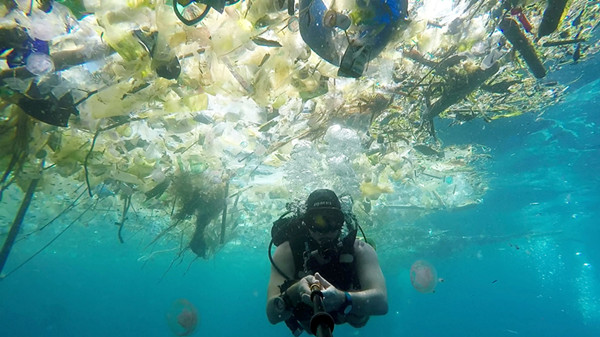
There is so much marine garbage that we can no longer turn a blind eye to it.
In the distance, the garbage patch in the North Pacific is so big that someone wants to apply for establishing a country to join the United Nations.
Nearby, as long as we leave the city and go to the fields,
You can see the garbage at the head of the ditch. As long as there is a river,
It has a chance to travel long distances into the ocean.
The sea is always impartial. If you care for it, it will give you a deep blue.
You throw rubbish at it, and it returns you to the pervasive microplastics.
Welcome to discuss where the marine garbage comes from and where it should go!
Topic of this issue
Chairman of Shanghai Rendu Marine Public Welfare Development CenterLiu yonglong
Graduated from Fudan University in 1997, resigned as a state-owned enterprise and has been engaged in the investigation and treatment of marine garbage.Where does the marine garbage come from? How to govern? What is the annual variation law of marine garbage? Which enterprises or individuals are the chief culprits of these rubbish?Welcome questions.
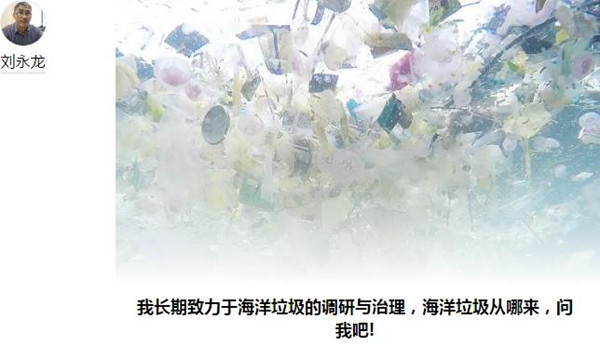
▍What is microplastics?
Q: How much garbage is there in the ocean?
Liu Yonglong:"There are more than 5 trillion pieces of plastic products floating in the ocean", "About 8 million tons of garbage belongs to the ocean every year" and "More than 20 million tons of waste plastics are directly discarded without treatment and eventually enter the ocean"-we can see the answers to this question from different angles, but no one can make it clear, because it is impossible for us to fish up the garbage in the ocean, weigh it or count it one by one.
Q: Is there more domestic garbage or industrial garbage in marine garbage? What are the main things of industrial waste?
Liu Yonglong:At the stage of marine garbage, it seems that industrial garbage and domestic garbage can’t be distinguished. We can only identify a few plastic bags and shoes, and we can barely identify some brands of garbage (about 11%), but we can’t tell which ones are industrial garbage.
Q: What is microplastics?
Liu Yonglong: According to the "Research Report on Some Typical Beach Garbage Monitoring in China (2017)" to be released by Shanghai Rendu Marine Public Welfare Development Center, microplastics can be roughly understood as follows:
Plastic garbage is gradually broken into plastic fragments in the marine environment. Due to long-term physical and chemical effects in the environment, such as weathering, solar radiation (photodegradation, embrittlement) or waves, these fragments will be cracked into plastic fragments or particles with a diameter less than 1cm or even lower. When the diameter is less than 5mm, it can be defined as marine microplastics.
From the genetic point of view, microplastics in marine environment can be divided into primary microplastics and secondary microplastics. Primary microplastics refers to small-sized plastic particles that are prepared into micron-sized particles at the beginning of industrial production, such as plastic beads added in industrial resin raw materials, toothpaste and cosmetics. Secondary microplastics refers to plastic particles which are cracked by large plastic fragments exposed to the environment (wind, waves, ultraviolet rays or from tire wear or clothing fibers). For example, discarded fishing lines can be cracked into ocean microplastics in the ocean. And microfibers from washing clothes.
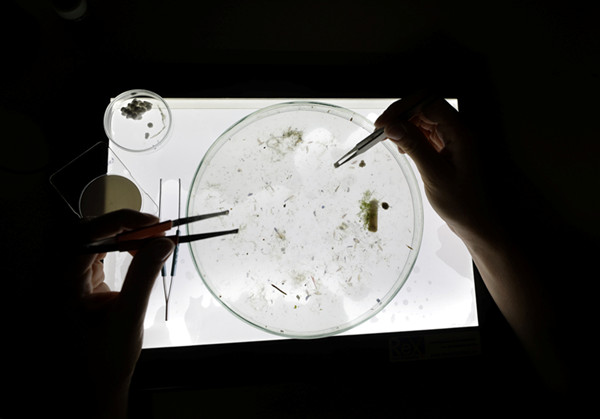
Q: What are the hazards of those people who finally arrive in microplastics? And whether microplastics in water can be removed by the existing technology?
Liu Yonglong:At present, there is little research on microplastics’s harm to human body, probably because of ethical issues and so on, and the conclusion is not clear. However, I have seen information that it is harmful to people’s immune system, because plastics can absorb toxic substances such as POPS in water and release them into the human body, and plastics themselves will release some substances. It is possible to remove microplastics in the prior art, but the cost is hard to estimate. On the one hand, the ecological cost will remove microorganisms while removing microplastics; On the one hand, the economic cost is so great that no one can try it. Therefore, to solve the problem, it is still at the source of the problem or not far from the source.
Q: Petrochemical industry ~ microplastics ~ Plasticizer, oil is the culprit?
Liu Yonglong:I quite agree with your perspective. My point is that our mineral products are so cheap that we can take out so much oil and coal to produce plastics, especially so many disposable plastics, and we can’t cherish the use of resources. If oil and coal are more expensive, we will choose to produce more durable things instead of cheap and short-lived products.
▍ Making and Discarding Garbage, China No.1
Q: Where does marine garbage come from? Which parties caused it?
Liu Yonglong:There is only one party, that is, people, and it is a specific person. However, who is this specific person? It can’t be traced unless she/he is caught throwing garbage at the seaside. We can reflect on ourselves. Am I one of them? Did I throw away the garbage somewhere?
Generally speaking, marine garbage has two sources: land source and sea source. According to experts’ estimation, 80% of the land resources and 20% of the sea resources are the 28 th rule again! 🙁
Another German scholar has studied that 15 great rivers have made great contributions and carried a lot of garbage into the sea. We have the Yangtze River, the Yellow River, the Pearl River and Heilongjiang in China … There are also studies, and China is marine garbage NO.1 There are many people and strength, and making and discarding garbage is also a big brother: (
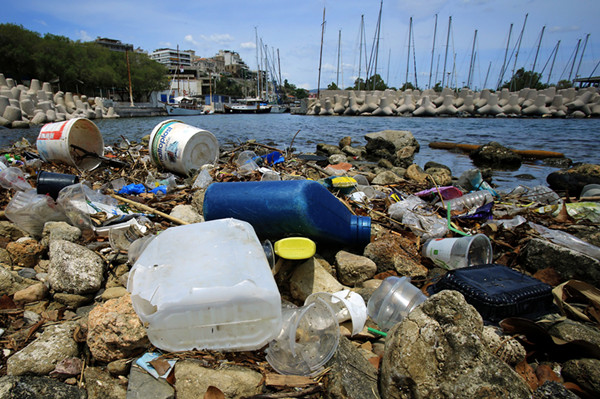
Q: What kind of garbage does Haiyuan refer to?
Liu Yonglong:A large number of fishing gear such as plastic buoys used in offshore aquaculture will be lost, and the offshore fishing industry will discard a large number of broken fishing nets. The shipping industry may directly discard the domestic garbage on board into the sea; Submarine cables may be damaged and abandoned; The construction and operation of drilling platform will produce domestic garbage and production garbage; Tsunamis, typhoons, etc. destroy coastal communities and produce a lot of various kinds of garbage …
Q: Apart from offshore operations, is there any dumping in the United States?
Liu Yonglong:The sources of marine garbage include offshore operations and dumping in the United States. However, 80% of marine garbage comes from land and is mainly carried by rivers. It is said that among the 8 million tons of garbage entering the sea every year, China contributes NO.1, and the Yangtze River contributes NO.1 to 15 rivers. We are not happy when others talk about China, so we talk about the United States in a confrontational way. Will it help solve the problem? It’s not Chinese or Americans who spoil the earth and self-destruct the foundation of existence, it’s people! On environmental issues, we must jump out of national boundaries, see the common destiny and reflect on ourselves.
Q: How much of the marine garbage can be recycled?
Liu Yonglong:How many? The answer should be a number. However, how did you get this figure? We can’t give a figure for the total amount of garbage in the ocean, so we can’t answer this question accurately. The recycling of marine garbage is more difficult. The collection, classification, transportation and cleaning … all need financial support. Can the final income make up for this cost? My judgment is impossible. According to recycling experts, 97% of garbage can be recycled, and this figure can be used for reference on the premise that there are no technical and economic obstacles.
Q: The garbage in the express delivery industry is amazing. There is a lot of plastic garbage attached to it. What can be done to change it?
Liu Yonglong:My personal way to change is to basically not purchase online and try to purchase in a physical store.
Some people are trying to optimize the technology and equipment of express delivery and reduce the use of plastic and plastic belts. Technical problems, technical cows are trying to solve them.
▍ Reduce garbage manufacturing from the source.
Q: How to treat marine garbage? What should I do after collecting and picking up? I think it is not only marine garbage, but also how to deal with domestic garbage at ordinary times. This year, I saw garbage sorting buckets and publicity in the community, but I don’t know how the effect is. My old mobile phones and computers are kept at home, and I don’t know what to do with them.
Liu Yonglong:When we talk about marine garbage treatment, we mean that the whole society should participate in dealing with the problem of marine garbage together and establish a system for marine garbage treatment. This governance is not the same as the governance of the Yellow River we talked about before. For the treatment of marine garbage, we have put forward a framework diagram of the treatment system. Please refer to the upcoming Monitoring and Research Report on Some Typical Beach Garbage in China (2017).
After collecting and picking up, we will ask the sanitation to transport it away, so that the garbage can return to the conventional disposal channels. We are also trying to hand over the recyclable garbage such as plastic bottles and cans to the waste recycling station for recycling.
As for the classification of community garbage, we can take part in it, so as to follow up and experience it. Only by participating in social change can we promote social change. Just watching and waiting for social change, I am afraid we have no sense of accomplishment.
Q: What is the general scope of marine garbage treatment? Who will be responsible for the scope beyond the sea and beyond?
Liu Yonglong:At present, there is no person in charge of marine garbage in the offshore, only some commercial beaches, and there will be businesses that operate bathing places, hotels and docks to clean them up. Far away, especially on the high seas, there is no government or commercial organization responsible. However, there is a Dutch foundation called cleanupocean, which is determined to clean up half of the garbage in the Pacific Ocean. Personally, I am not very optimistic, but I have not fully understood how they are going to achieve it. I will share it after I study it:)
Q: At present, are there any substantive clean-up measures for marine pollution by the relevant organizations of marine protection in the world?
Liu Yonglong:Yes! On the third Saturday of September every year, it is International Beach Cleanup Day (ICC). ICC coordinators from nearly 150 countries and regions around the world organize local ICC activities to carry out clean-up activities on beaches, sea surfaces and seabed to substantially clean up marine debris. My institution, Shanghai Rendu Ocean Public Welfare Development Center, is the ICC coordinator in Chinese mainland. Since 2015, every year, ICC Day and Ocean Day (June 8) will organize nationwide joint actions to clean up beaches.
Finally, I want to say that marine garbage can’t be solved by cleaning up. We believe that we must reduce the production of garbage by controlling consumption.
Q: Is there any special fund for treating marine garbage?
Liu Yonglong:The responsibility to control marine garbage is broken down in many departments and supported by some funds, but as a non-governmental organization, we can’t get special funds from the government finance, which is the case at present.
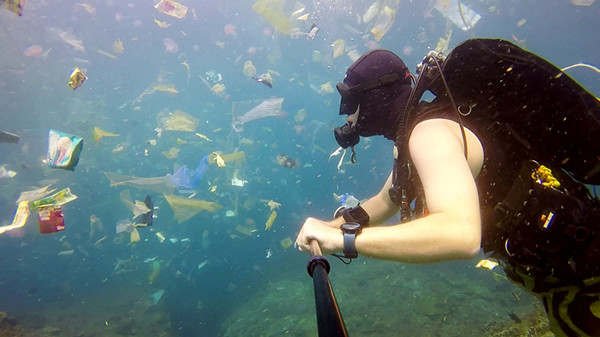
Q: What specific laws and policies are there to regulate the treatment of marine plastic waste in China? Should specific and clear plastic management regulations be issued to deal with plastic waste pollution? If so, what is the focus of the regulations?
Liu Yonglong:There is no law to deal with the problem of marine plastic waste treatment directly. Plastic waste pollution, as a problem, has not been specified and has not become the goal of law. Corresponding laws should be promulgated. Personally, I would expect the law to focus on controlling the use of plastics, increasing the cost of plastic use, and reducing the use of plastics to a reasonable position through market mechanisms to avoid unnecessary use of plastics.
Q: As an ordinary person, is there any practical way to help reduce marine garbage?
Liu Yonglong:Yes! First of all, make sure that all your garbage is thrown into the trash can, and it will not become out of control and will not fall on the streets, fields and beaches; Secondly, when you see out-of-control garbage, you might as well pick it up and throw it into the trash can; Once again, when you see someone throwing away garbage or leaving it behind, remind them to pick it up and throw it into the trash can; Further, control consumption and reduce the production of garbage.